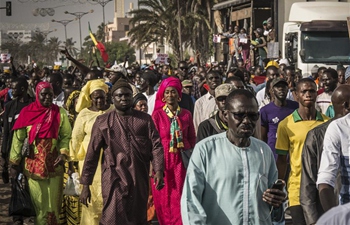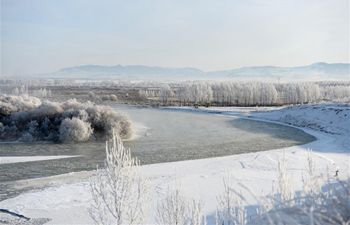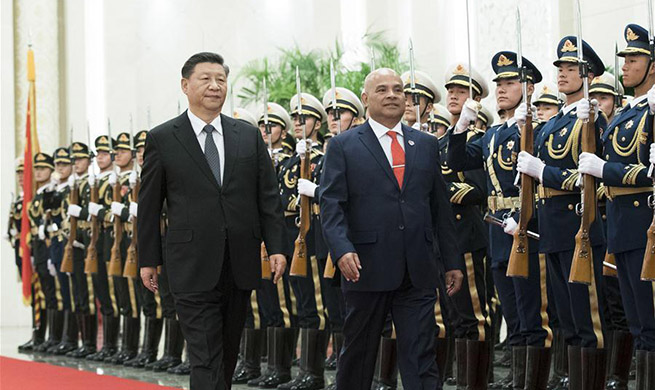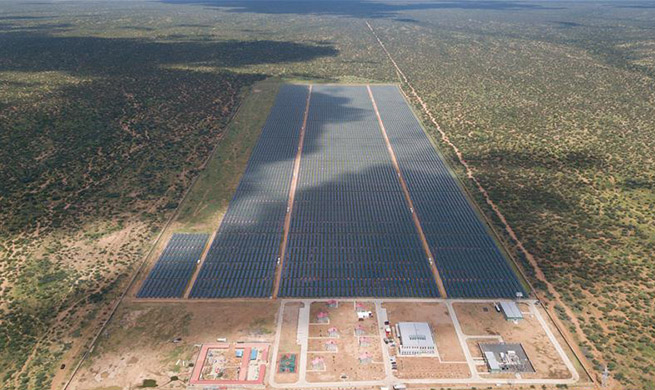ISTANBUL, Dec. 14 (Xinhua) -- Sending troops to Libya to support the Tripoli-based government would make Turkey part of the ongoing civil war with a considerable risk of failure given the power equation largely favoring the Tobruk-based rival forces in the North African country, Turkish analysts cautioned.
Turkish President Recep Tayyip Erdogan said earlier this week that Ankara may send troops to Libya if the UN-recognized Libyan government were to make such a request.
Erdogan's remarks came at a time when the Tobruk-based army led by Khalifa Haftar was preparing for an attack to capture Tripoli, where the UN-recognized Government of National Accord (GNA) is based.
Sending some troops would not be enough to block Haftar's forces, but such a move would make Turkey actively involved in Libya's civil war, said Cahit Armagan Dilek, director of the Ankara-based 21st Century Turkey Institute.
"This may cost dearly for Turkey," he told Xinhua, noting Ankara may face sanctions and fail to get much-needed political and economic support at a time when the country is grappling with major economic and foreign policy problems.
On Nov. 27, Ankara signed security and military cooperation agreements as well as a controversial maritime boundary memorandum with the GNA.
The maritime boundary deal, which covers areas also claimed by Greece, was denounced by Greece, Egypt and Cyprus as a violation of international law.
Things are getting more difficult for Turkey in Libya given that the coalition of forces Ankara is confronted with there is getting stronger, Ilhan Uzgel, an international relations analyst, told Xinhua.
The European Union, of which Greece and Cyprus are members, said on Friday that the memorandum is not legally binding for third parties as the Law of the Sea and the sovereignty of third parties are being violated by it.
U.S. Ambassador to Greece Geoffrey Pyatt signalled Washington's support for the Greek view, saying on Thursday that inhabited islands are also entitled to have continental territory.
"The pressure over the Ankara-backed government in Libya would increase following this memorandum and Greece may adopt a more aggressive attitude by offering support to the Haftar-led forces," remarked Uzgel who formerly taught at Ankara University.
Athens expelled the Libyan ambassador following the conclusion of the memorandum and sent a letter of complaint to the United Nations saying the deal does not take into account the Greek islands' right to continental shelf and exclusive economic zone.
"Turkey will apparently do its best to keep the GNA in power, because the GNA is the only political structure Ankara can cooperate with in the Eastern Mediterranean," Uzgel stated, noting Turkey has long been isolated in the region.
However, Dilek, a former staff officer in the Turkish navy, does not think Turkey needs to get involved militarily in Libya to protect its rights in the Mediterranean.
"Because Turkey is right anyway as far as fundamental principles of the Law of the Sea are concerned," he said, stating that Turkey's way of demarcation in the Mediterranean would also serve the interests of other litoral countries.
It is widely argued in Turkey that Libya, Egypt and Israel would lose a considerably large area in exclusive-economic-zone demarcation when they conclude deals with Greece and Cyprus instead of with Turkey.
For Ankara, the maritime boundary deal also represents a counter step against Greece, Cyprus and Egypt which had earlier jointly delimited their exclusive economic zones in the Eastern Mediterranean in a way Turkey calls unacceptable.
"The memorandum is a strong answer to efforts by Greece and Greek Cypriots to contain, isolate Turkey in the Mediterranean," Erdogan said.
The Turkish leader added that the Greek Cyprus, Greece, Israel and Egypt cannot build a natural gas pipeline through the area designated by the memorandum without Ankara's approval.
In recent years, Israel, Egypt and Cyprus have struck natural gas in the Eastern Mediterranean which is known to be very rich in gas reserves.
A senior navy officer from the Tobruk-based rival forces reportedly said he was ordered by Haftar to sink any approaching Turkish research vessels.
Haftar, who failed to capture Tripoli in a major attack earlier this year, announced late Thursday that the "decisive battle" to seize Tripoli began.
The Turkey-backed GNA currently controls a very small portion of the Libyan territory along the Mediterranean.
Both analysts see the Turkish-backed Libyan government as the chain's weakest link in the bilateral deal and feel Ankara's initiative risks being short-lived given the precarious situation facing the GNA.
"It's not certain whether the GNA will remain in power," remarked Uzgel.
Unless Ankara makes similar agreements with other litoral states, the deal with Libya may well turn out to be useless, Dilek said.
Following the killing of the Libyan leader Muammar Gaddafi in the NATO-backed uprising in late 2011, the country has descended into chaos.
Since 2014, Libya has been mainly controlled by two rival groups, the UN-recognized, Tripoli-based Islamist government in the northwest and the Tobruk-based elected parliament in the east.
Turkey and Qatar support the GNA, while Haftar's forces are backed by France, Russia, Egypt and the Gulf countries.
In his remarks on Monday, Erdogan also expressed hope that Russia would stop supporting Haftar, arguing that any support given to him would be illegal as the general is an outlaw.
Besides, the president said he does not want Ankara and Moscow to be involved in confrontation because of Moscow's support to Haftar, as was the case early in the Syrian war.
Erdogan's remarks reveal that Ankara's active involvement risks damaging ties with Russia, with which Turkey has been cooperating in Syria since 2016.
Turkey is reported to have already provided military equipment, including drones, to the Tripoli-based government.
Providing military support to the GNA would mean confrontation with Russia in Libya and it would also negatively affect the cooperation in Syria between Ankara and Moscow, said Dilek.
The United States does not openly favor any of the warring factions in Libya. A U.S. delegation met with Haftar over a political settlement in Libya at the end of last month.
Dilek is concerned that Turkey may get militarily involved in Libya with Washington's encouragement behind closed doors.
Washington's silence regarding the maritime accord between Ankara and Tripoli suggests it could support an alliance against Russia in Libya, he argued.
"If Turkey would militarily support the GNA by wrongly assuming that it would have the U.S. backing, that would be a strategic fault," cautioned Dilek.

















